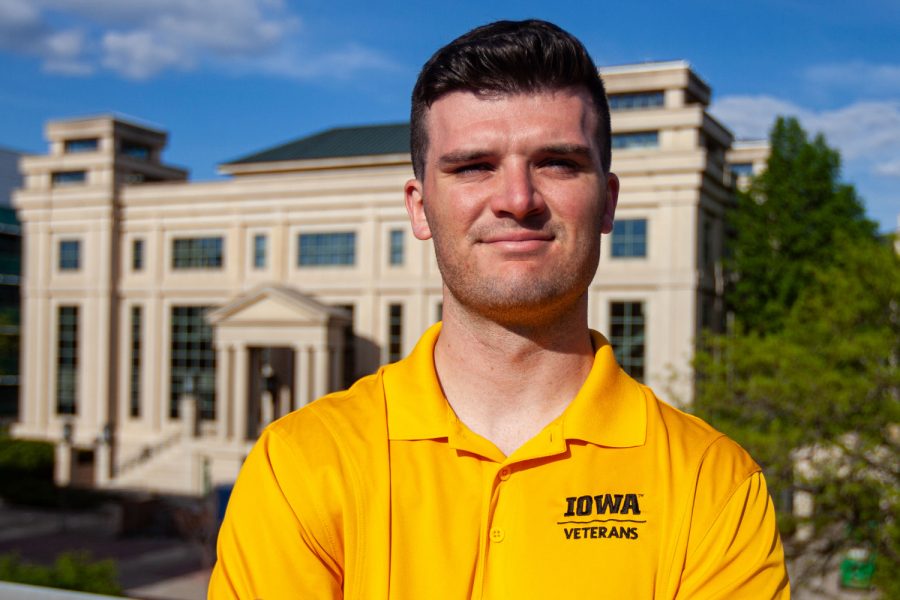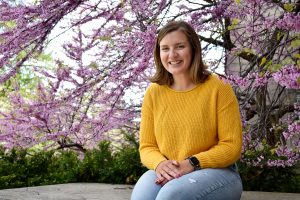Graduating at any age: how two nontraditional students navigated their time at the University of Iowa
While the 2020-21 academic year wasn’t “normal” for any student, some nontraditional students at the University of Iowa felt even more pressure in the journey to sinching their degree because of COVID-19.
Graduating student veteran, Paul Richards, poses for a portrait outside of Calvin Hall on May 4, 2021.
May 11, 2021
When Mekhia Hillgren realized she would only have one “normal” semester of college, she contemplated changing her graduation plans.
Hillgren came to the University of Iowa in fall 2019, fresh out of high school and already bearing an associate degree. The English and Creative Writing major will graduate this spring at age 18.
Since the COVID-19 pandemic forced her to move home within her first year at the university, she said she almost changed her plans.
“I definitely considered staying for another year or two because I was only on campus for one semester of normal college,” she said, “… but I decided not to because I want to start working full time.”
Hillgren always planned to graduate early and join the workforce as soon as possible. After the UI deepened her love of writing, however, Hillgren said she now plans to attend graduate school after she takes a gap year to work.
Hillgren said she hopes to enjoy a more traditional campus experience after a break from school.
It is typical for UI students who follow nontraditional paths to graduation to have different hurdles in getting their degrees, said 2021 graduate Paul Richards, an international relations student, and U.S. Army veteran.
He said the pandemic has only exacerbated some of the issues nontraditional students face.
“We as an identity struggle in a lot of ways with feeling like we belong on campus,” he said. “A lot of [veteran and nontraditional] students are older, they might have children or other obligations, so a lot of the way we interact is face to face and it’s crucial to develop relationships and camaraderie that way.”
Richards graduated from high school in 2015 and came to the UI in 2018, after serving in the Army in Afghanistan and Kuwait. He always planned to graduate in spring 2021, but said online learning put some bumps in his road.
As an interactive and auditory learner, Richards said it has been challenging to stay engaged in classes over the last year. He said engagement inside and outside of the classroom has been a struggle for him and others involved the UI’s Veterans Association, an organization that helps veterans and the military community acclimate to the university.
He said it’s hard to convince students to jump onto another Zoom call at the end of the day, but that he hopes students will continue to be engaged over the next few years to get the full college experience.
“If you go to college and all you leave with is a bachelor’s degree, I think you did it wrong,” he said. “The engagement, the partnerships, the interactions, and the experiences — that’s a part of what you gain from college. It’s been difficult this year to engage, but that’s what college is about.”
Hillgren and Richards both used resources on campus to help navigate a nontraditional path through the university. Hillgren said she has had nine advisers in two years at the UI, adding that English and Creative Writing advisers helped her navigate her major and sustainability certificate in that time.
Iowa Veteran Education, Transition, and Support helped Richards meet students with shared experiences.
Chelsea Burk, director of the Iowa Veteran Education, Transition, and Support office, said nontraditional students often have more problems on their plates than traditional students who go to college directly from high school.
She said she’s seen the resilience of nontraditional students over her years at the university, but the pandemic added another layer to the situation.
“With nontraditional students, you have to remember how much resiliency they have had to show already,” she said. “They deserve our flexibility and our support in whatever ways possible, especially during the pandemic. We’re all trying to do the best that we can with what we have right now, and nontraditional students often have more complications and nuances.”
She said veteran students typically have an additional graduation celebration, but Iowa Veteran Education, Transition, and Support couldn’t hold its awards dinner the last two years because of the pandemic. Burk hopes the office will be able to adapt its celebrations in the future to recognize more students.
Richards said finding his community has been the defining experience of his three years at the UI. As he moves on from his time at the university, he said he hopes more students can find people with shared experiences like he did.
“It’s not a stretch to think I wouldn’t have graduated without the opportunities that IVETS provided me,” he said. “I was able to interact with my peers and members of the military active community in a way I wouldn’t necessarily feel comfortable interacting with a traditional student. I’m not sure I would’ve graduated without them.”
Hillgren said she has no regrets about graduating early and doing her education her way, despite the fact her college experience was nothing like she imagined it would be.
“I don’t like regretting things and I think graduating early was really effective,” she said. “… I know what I want to do for the rest of my life, and I can finally start on it.”






